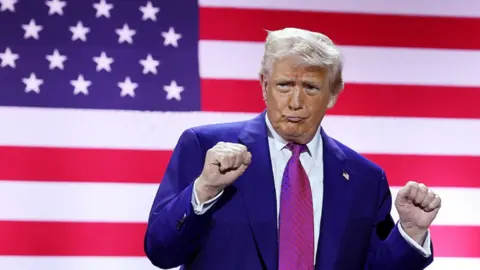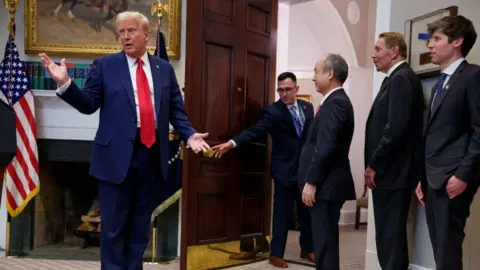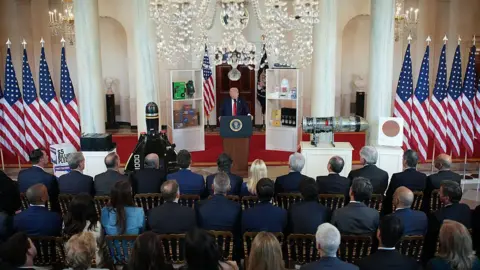The reality behind Trump's incredible investment claims

 Getty Images
Getty ImagesUS President Donald Trump may have called tariffs his favourite word in the dictionary. But when it comes to obsessions, business investment has got to be close.
As of last month, he said more than $12 trillion (£8.8tn) had been "practically committed" on his watch. "Nobody's ever seen numbers like we have," he said, crediting his agenda of tariffs, tax cuts and deregulation with making the difference.
If true, the figure would indeed be astonishing, potentially tripling the roughly $4tn in gross private investment the US reported all of last year.
So is a sudden gush of business spending setting the stage for a new golden economic era as Trump claims, or is it all theatre?
First things first: it is too early in Trump's tenure to have clear data to evaluate his claims. The US government publishes statistics on business investment only every three months.
January to March, which reflect two months of Trump's tenure, show a strong jump in business investment, albeit one that analysts said was partly due to data skewed by an earlier Boeing strike.
Other anecdotal and survey evidence indicates that Trump's impact on investment is far more incremental than he has claimed.
"We have hardly any data at this point and almost all the information we have is probably for investment projects that were planned and ordered last year," says economist Nick Bloom, a professor at Stanford University whose work looks at the impact of uncertainty on business investment.
"My guess is business investment is down a little bit, not massively... primarily because uncertainty is quite high and that will pause it."
Swiss pharmaceutical firm Roche, which announced plans to invest $50bn in the US over five years in April, is a good example.
Some of the projects included in the sum were already in the works.
Executives have also warned that some of Trump's ideas - in particular a proposal to overhaul drug pricing - could imperil its plans.
"The pharma industry would need to review their expenses including investments," the company said.

 Getty Images
Getty ImagesTrump typically makes his case pointing to investment promises made by high-profile firms such as Apple and Hyundai.
The White House keeps a running tally of those announcements, but at the start of June, it put total new investments at roughly $5.3tn - less than half the sum cited by Trump.
Even that figure is inflated.
Roughly a third of the 62 investments on the list include plans that were at least partially in the works before Trump took office. For example:
- US manufacturer Corning is listed for a $1.5bn investment in a new manufacturing plant, but the core $900m of the project was announced in early 2024.
- Stellantis, on the list for a $5bn plan to reopen a factory in Belvidere, Illinois, initially made that promise in 2023.
- Other commitments include items that are not traditionally considered investments at all - like Apple's $500bn spending pledge, which includes taxes and salaries paid to workers already at the company.
- An investment promise, by ADQ and Energy Capital, is not limited to the US.
Falling 'well short' of headlines
In reality, as of mid-May, new investment stemming from the announcements likely totalled something closer to $134bn, according to analysis by Goldman Sachs.
That sum shrank to as little as $30bn, not including investments backed by foreign governments, once researchers factored in the risk that some projects might fail to materialise, or would have happened anyway.
"Though not negligible economically, such increases would fall well short of the recent headlines," they wrote.
When pressed on the numbers, White House spokesman Kush Desai brushed off concerns that the administration's claims did not match reality.
"The Trump administration is using a multifaceted approach to drive investment into the United States... and no amount of pointless nitpicking and hairsplitting can refute that it's paying off," he said in a statement, which noted that many firms had explicitly credited Trump and his policies for shaping their plans.

 Getty Images
Getty ImagesThe BBC approached more than two dozen firms with investments on the White House list.
Many did not respond or referred to previous statements.
Others acknowledged that work on some of their projects pre-dated the current administration.
Incentive to exaggerate
Exaggeration by politicians and companies is hardly unexpected.
But the Trump administration's willingness to radically intervene in the economy, with tariffs and other changes, has given companies reason to pump up their plans in ways that flatter the president, says Martin Chorzempa, senior fellow at the Petersen Institute of International Economics.
"A firm making an announcement is a way to get some current benefits, without necessarily being held to those [spending pledges] if the situation changes," he says. "There's a strong incentive for companies to provide as large a number as possible."
That's not to say that Trump policies aren't making a difference.
The tariff threats have "definitely been a catalyst" for pharmaceutical firms to plan more manufacturing in the US, a key source of sector profits, says Stephen Farrelly, global lead for pharma and healthcare at ING.
But, he adds, there are limits to what the threats can accomplish.
The pharma investments are set to unfold over time - a decade in some cases - in a sector that was poised for growth anyway.
And they have come from firms selling branded drugs - not the cheaper, generic medicines that many Americans rely on and that are made in China and India.
Mr Farrelly also warned that the sector's investments may be at risk over the long term, given uncertainty about the government's approach to tariffs, drug pricing and scientific research.
Overall, many analysts expect investment growth to slow in the US this year due to policy uncertainty.
Economist German Gutierrez of the University of Washington says Trump is right to want to boost investment in the US, but believes his emphasis on global competition misdiagnoses the problem.
His own work has found the decline in investment is due in part to industry consolidation. Now a few large firms dominate sectors, there is less incentive to invest to compete.
In addition, the kinds of investments firms are making are typically cheaper items such as software rather than machines and factories.
Tariffs, Prof Gutierrez says, are unlikely to address those issues.
"The way it's being done and the type of instruments they are using are not the best ways to achieve this goal. It just takes a lot more to really get this going," he says.


Follow the twists and turns of Trump's second term with North America correspondent Anthony Zurcher's weekly US Politics Unspun newsletter. Readers in the UK can sign up here. Those outside the UK can sign up here.
